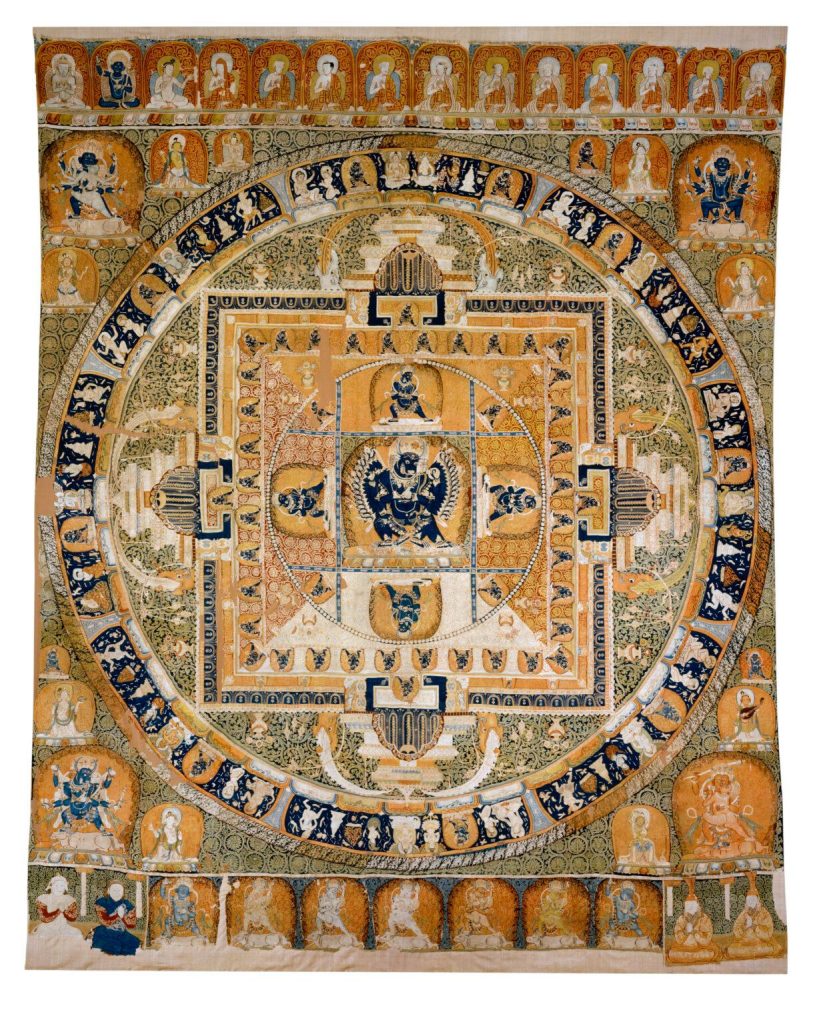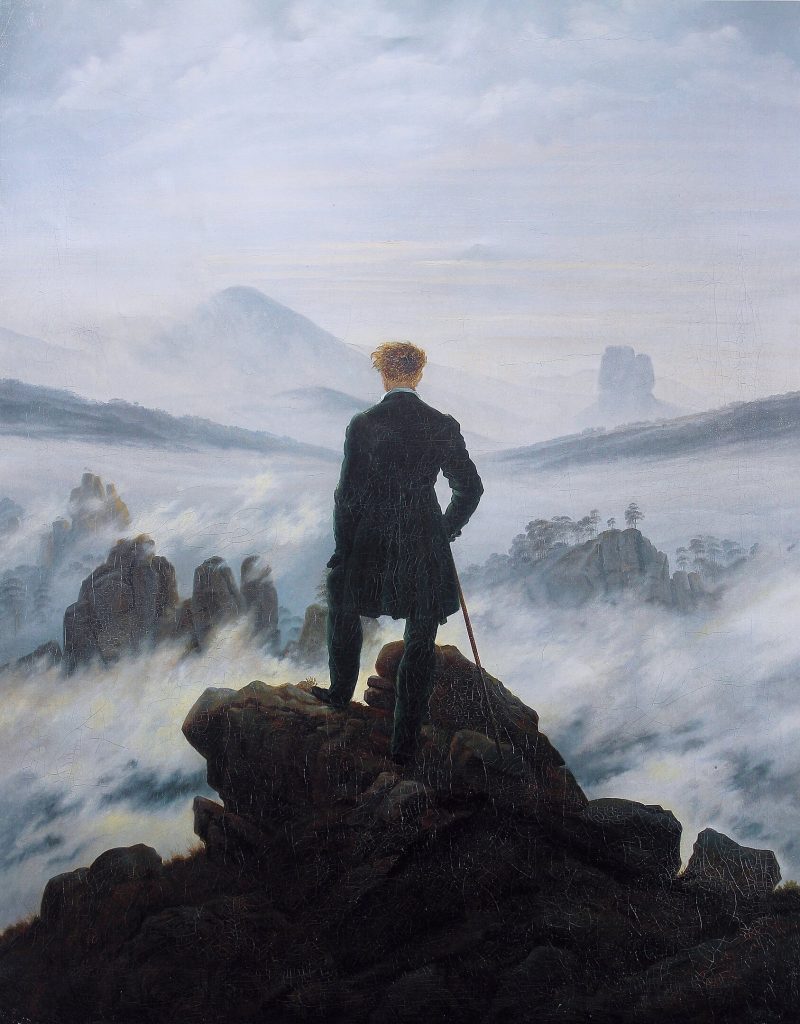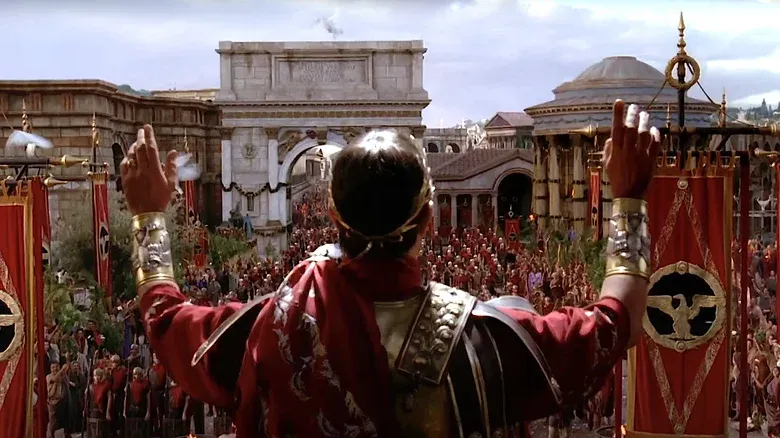
The New Age Of Caesars
and what to do about it
by StJohn Piano
This essay was written for all those who let their understanding flow with the process.
Why Liberal Democracy Is Collapsing
It can’t adapt to the challenges of our new environment.
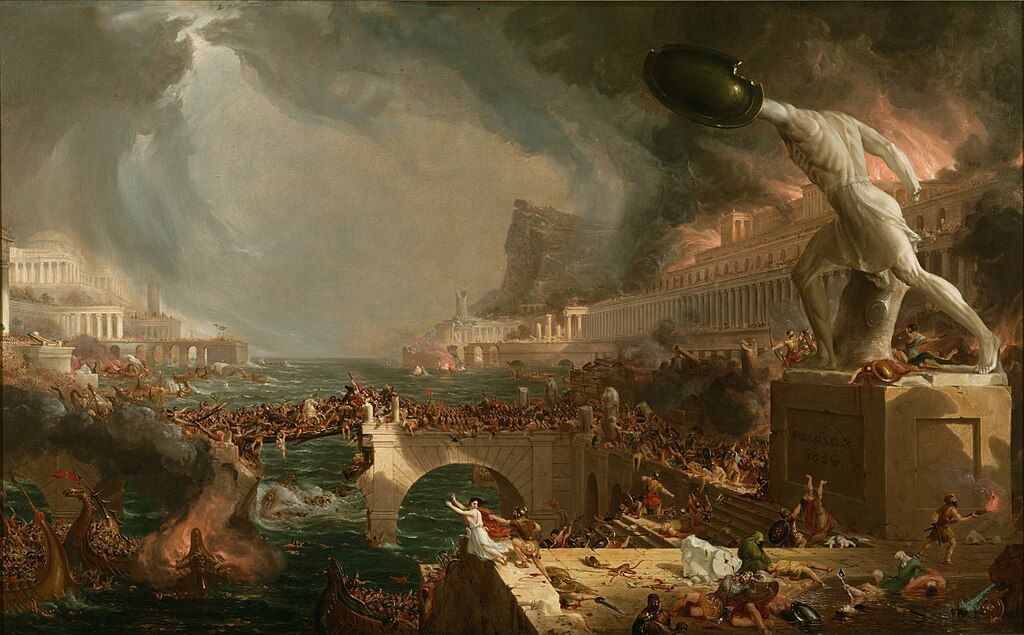
“All government, of course, is against liberty.”
~ H L Mencken
Officially, we live inside a system called Liberal Democracy.
Liberal Democracy is one of the three ideologies that emerged after the Industrial Revolution. The other two were Fascism and Communism. Each of them proposed an answer to the central problem of their time: “How do we organize ourselves around factories ?”
The problem was urgent and inescapable. Factories were rapidly disrupting the existing social and economic orders.
We call this transformation “Industrialization”.
The old systems, the monarchies and empires, could not adapt fast enough. They could not make the best use of the new tools. They were defeated, conquered, and absorbed by systems that did.
By 1945, one of these ideologies, Fascism, had been utterly defeated. The remaining two competed against each other, until Communism collapsed in 1991. Through the harshest test available, survival of the fittest, we discovered which system was strongest.
Liberal Democracy had conquered the world. All its ideological alternatives were dead.
No serious player today is genuinely interested in trying Fascism or Communism again. There are always some people who will pick up the symbols and flags and ideas, to see if aspects of them can be revivified, but this continually fails. Few can bring themselves to believe that these could actually be the basis of an entire socioeconomic system.
This is because every ideology is an adaptation to its particular time and place. Fascism and Communism were competitive in the 20th century. Many, many people thought that those systems could be humanity’s future.
But the world has moved on. The tech has changed. The problems have changed. Insistently replaying old ideologies will not help.
Here is my thesis: Liberal Democracy is now as irrelevant as Fascism and Communism.
Why ? Because we are now going through the Network Revolution. The central problem of our time is “How do we organize ourselves around computer networks ?”
The problem is urgent and inescapable. Networks are rapidly disrupting the existing social and economic orders.
We could call this transformation “Networkization”.
We’ve just been through the Information Revolution: Computers and the Internet. During this period, we moved our documents online. This caused significant disruption, but our system was able to adapt.
The Network Revolution is the movement of everything into computer networks: Money, government, religion, research, publishing, marriage, business, literature, debate, and identity. This is a civilizational shift, on the same scale as the Industrial Revolution. It is happening now.
Today, Liberal Democracy is the old system. It can’t adapt fast enough to remain relevant.
New ideologies are going to emerge, that do adapt to the new environment, that do make the best use of the new tools, and they are going to displace and conquer Liberal Democracy, in the same way that Liberal Democracy displaced and conquered its competitors.
How Caesars Emerge
Caesars emerge from exceptions that the system cannot handle.
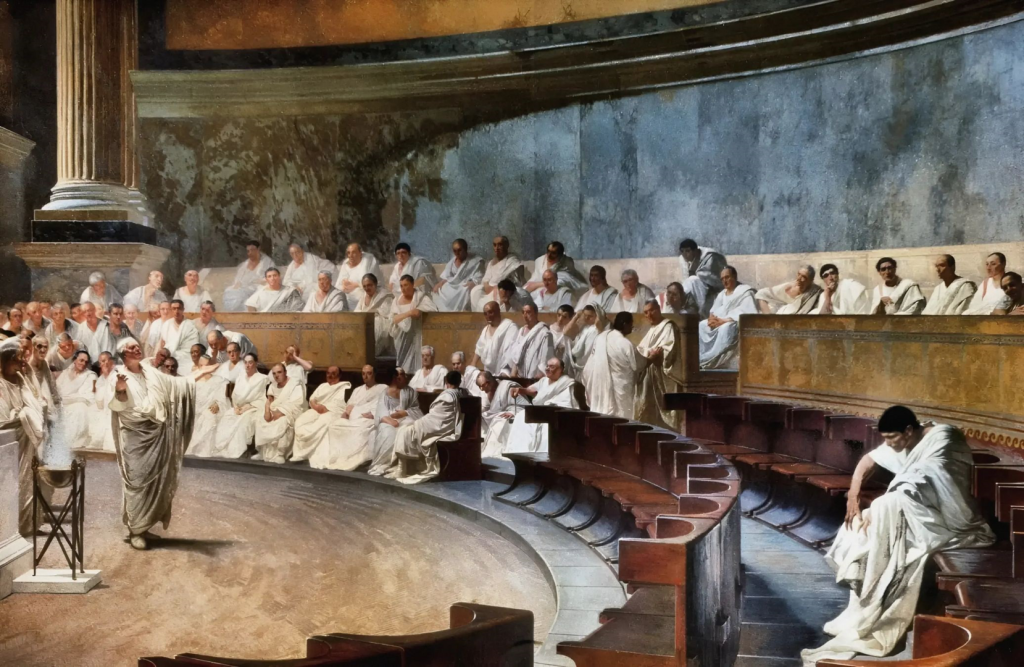
“Sovereign is he who decides on the state of exception.”
~ Carl Schmitt
Let’s do a quick thought experiment. Imagine, dear reader, an important problem that you think is serious, urgent, and large-scale.
If you spoke in front of your Parliament / Congress / Government, would anyone act ?
Or would everyone continue with business-as-usual ? Would the politicians just ensure that the vested interests are protected, and everything else is delayed and avoided ?
I think, if you pause for a moment, and play the scene out in your mind, that you know the answer. This means that underneath your mind – in your gut, your body, your unconscious – you can sense that your Congress is not the place to go for help.
We no longer believe that the institutions of Liberal Democracy can solve our problems.
As the problems that we face become more urgent and unescapable, and as the existing system tries very hard to ignore them, someone is going to decide what to do.
Many people will be looking for someone to turn to. This creates pressure. This pressure has to go somewhere.
So, as these problems produce exceptions that our system cannot handle, the pressure increases, and sovereigns emerge in response.
These sovereigns will be our new Caesars.
I could name possible candidates, but that’s not really the point.
The point is that increasingly we believe that our best hope lies with men who can take up a sword and make something happen.
This is the source of a Caesar’s legitimacy and support. No man rules alone. Caesar must have an army.
This army need not be large. Caesar marched on Rome with a single legion.
Why Caesars Are Welcomed
No one believes that the system will help them have families.

“Men make history, but they do not make it as they please.”
~ Karl Marx
Like most empires, the Roman Empire was almost accidental. No one planned it. It emerged through the constant need to fight ever-more-powerful enemies, the religious obligations to ancestral gods, the rhythm of the seasons of farming and fighting, the coalition-building with neighboring polities, and the desire of generals for glory and wealth. It was a cultural activity, not a strategy.
The Romans were better at this activity than anyone else. They remain a reference point for us today, more than two thousand years later.
But their success brought changes that destroyed their internal culture.
Their legions were originally composed of smallholder farmers, who fought as a collective to defend their families and homes. Their strength came from their willingness to submit to discipline of legendary harshness.
As the legions spent more time abroad and less time farming, and as wealth flowed back into Rome and Italy, wealthy Romans began to acquire the small farms and combine them into vast plantations filled with imported slaves.
When the legionaries returned, they no longer recognized the homeland for which they had fought.
The cultural bonds, the sense that “we’re all in this together”, the implicit obligations between the classes and groups within Roman culture – these had been broken.
I presume, dear reader, that all of this sounds remarkably familiar. In our own time, we see oligarchs building vast industrial and informational plantations staffed by wage slaves on zero-hour contracts. Who would fight for such a culture, except mercenaries ?
So: The Romans were faced with a problem: What do we do with former soldiers ? They have weapons, they’re good at using them, and they have no reason to accept the new system.
The first approach was to plant colonies of retired soldiers elsewhere, outside of Italy, in the conquered lands. Many current-day European cities are descended from these colonies.
But the second approach was always there, waiting. A general had the option to raise a banner, declare the Republic null and void, and march inwards, to claim the system for himself and for his men.
Here’s the thing: The men knew that there was nothing to go back to. They knew that the system was not interested in helping them to build homes and families, but instead would use them up and throw them away.
So when Caesar raised a banner, they followed him.
And later, when Pompey, Brutus, Cassius, Mark Antony, and Octavian raised their own banners, men followed them too.
A lot of older people today seem to be only mildly concerned about the disintegration of social bonds in modern culture. They acknowledge that most men not marrying and forming families is probably a problem, but they don’t see it as a big issue. It’s tolerable.
But I do think it’s a problem.
Because I know what comes next – dissolution.
Such men have no reason to accept the current system. No reason at all.
And sooner or later, a Caesar will raise a banner.
How New Systems Are Established
A man takes power, then establishes a new code of behavior.
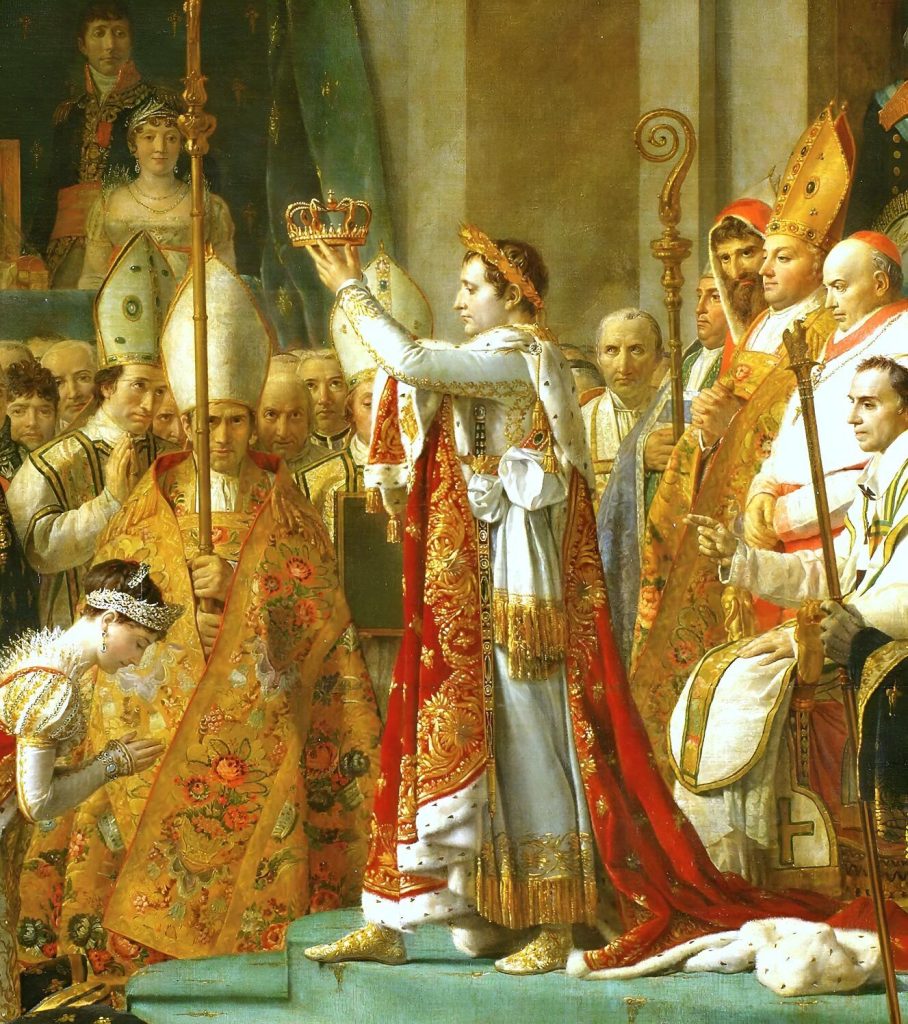
“Every institution is the lengthened shadow of one man.”~ Ralph Waldo Emerson
According to the Greek historian Polybius, human societies follow a cyclical pattern, called anacyclosis. War or disaster might alter its expression, but it is always the underlying rhythm of our political experience. Each new turn of the cycle creates new conditions, to which everyone must adapt, which causes a new turn to occur.
First, there is a king, who takes power and is accepted due to his personal qualities as a leader. His descendants inherit his crown, but are not as great as he was. The monarchy decays into a tyranny.
Strong leaders, tired of incompetent tyranny, overthrow or force concessions from the monarch, transforming the society into an aristocracy, which in turn degenerates into an oligarchy.
Sometimes, at this point, a middle class emerges. If it is successful enough, it can win concessions from the aristocracy, and the society becomes a democracy.
Regardless of whether the society goes through a democratic stage, it eventually becomes a plutocracy, an oligarchy based on wealth. The original aristocrats were hard men, capable of waging war. Their descendants prefer to bankrupt their enemies.
The masses become ever poorer, preyed upon by rapacious financial predators. They are no longer free citizens – they are a desperate mob. Demagogues rise, appealing to the hopes of the mob – the society has become an ochlocracy (which means government by the populace, or mob rule).
The chaos becomes unbearable. Eventually, people will do anything to make it stop. They search for a strong leader…
And a new king rises, and the cycle of adaptation starts again.
Let’s delve into this:
1) There are three “constructive” stages and three “chaotic” stages.
Constructive: Monarchy, Aristocracy, Democracy.
Chaotic: Tyranny, Oligarchy, Ochlocracy (mob-rule).
2) Each constructive stage degenerates into its corresponding chaotic stage.
The pairs can be described as:
- The Rule of One (Monarchy / Tyranny)
- The Rule of Few (Aristocracy / Oligarchy)
- The Rule of Many (Democracy / Ochlocracy)
Here is the sequence:
Monarchy -> Tyranny -> Aristocracy -> Oligarchy -> Democracy -> Ochlocracy -> Monarchy
There is a shorter sequence that skips the Democratic stage:
Monarchy -> Tyranny -> Aristocracy -> Oligarchy -> Monarchy
3) Each cycle permits a new growth phase.
At the end of each stage, there is chaos. People are fighting for control of the next stage.
It is more difficult to raise a family.
But then a new order is established, and the next stage begins.
People’s energy shifts away from politics and towards marriage, family, and community.
4) Efficiency vs Stability
It’s an inescapable trade-off.
A single mind is most effective, but also the most variable.
In the midst of chaos, a single man is best placed to envision and establish a new order. He can move towards his vision more efficiently than a group can. A group must always debate and discuss internally before settling on a course of action, and its resolve is always weaker than that of one man.
However, once a new order is established, the high variability of a single mind becomes a source of chaos / disorder, and others desire to limit that source in order to protect themselves from it, and the monarchy gradually becomes an aristocracy.
So: We seek out a new order, and then we try to stabilize it and institutionalize it.
Eventually the institution becomes a straitjacket that prevents necessary adaptation, and this produces chaos and disorder, and the cycle starts over.
…
This is the pattern of life itself…
This is the deep pattern, deeper than us, that rises up from the deep-drum rhythms of the world…
I think of a society as a living thing, whose cells are people and families and towns and churches, and it has a lifecycle, and our history books celebrate its life and mourn its passing and remember its words, the same as we do for people…
…
Now, let’s use this model to explore some interesting consequences.
1) A society can be very small.
A football club, a church, a town, a business, a theatre group, a spy agency, a government department, or a software company.
I think that the same dynamics play out in all societies.
In societies that are large enough in time and space to have generations of people, i.e. villages, towns, cities, churches, and governments, the effects compound and become much clearer, but they are still present at the lower levels, just in a muddier fashion.
2) None of the forms of government (Rule of One / Few / Many) are inherently good or bad. They simply have good and bad forms.
Their goodness depends on the virtue of the rulers. I am using the word “virtue” in the classical, Roman sense, which means courage, valor, strength, and excellence.
It is far better to live under a good king than a bad democracy.
And of course, it is far better to live under a good democracy than a bad king.
So I invite you to ask yourself: Do those who rule over me have virtue ? Do they demonstrate courage, valor, strength, and excellence ?
3) I think that the most interesting part of the cycle is this: That every time a new constructive stage occurs, its builders are creating a new adaptation of their society to the surrounding environment.
This is how we make deep structural adjustments to our societies that are necessary for us to continue. The new rulers will tally up (consciously or not) all the changes that have emerged since the last constructive stage, and incorporate them into the new one.
Sometimes they do it well, sometimes not.
Let’s look briefly at a couple notable examples.
a) At the end of the Roman Republic, after all the bloodshed, one man was left standing: Octavian, Caesar’s great-nephew and adopted son. Fortunately for the Romans, he was a great man and a wise one. He carefully but thoroughly reshaped his society into a new monarchical structure. He kept the old forms of the Republic so that people did not have to accept too much change. The Roman Empire continued for another 400 years.
b) At the end of the Tsarist Monarchy, as the entire system collapsed under the pressures of war and hunger, one man seized control of the Bolshevik party, and then the party seized control of Moscow. This man was Lenin. Unfortunately for the Russians, he was a great man, but not a wise one. He correctly understood that the old system could not continue. But, unlike Augustus, who bent the old forms into a new synthesis, Lenin destroyed all the old forms and attempted to restructure all of society around a new ideal. This new structure was brittle and repressive, and eventually expanded into complete totalitarianism. It fell apart 74 years later.
…
Looking around in the west, it seems obvious that we are in the post-democratic ‘plutocrat stage’, and moving rapidly into the desperate mob & demagogue stage.
No one believes the plutocrats’ promises anymore. “A better life tomorrow if only you obey and work harder” is no longer persuasive.
Hence the political opportunity for demagogues.
The problem with demagogues: They can’t actually fix anything. Their rule is unstable – it depends on endless appeals to the emotions and desires of the mob, which is not famous for its critical thinking skills. If a demagogue does not sufficiently please the mob, he is outflanked by another who will, and is displaced and thrown down.
A new constructive stage will occur only if one of them, with sufficient courage, valor, strength, and excellence, seizes power and establishes a new system, adapted to the needs of the time.
And so, dear reader, you can see that I am not saying “Beware of the new Caesars, who must be defeated”. I am saying “We are heading rapidly to a place where we will pray for a Caesar to come”.
And further, I am saying that this is the most appropriate reaction, with the best chance of a good outcome – a new constructive stage for our society.
Where Caesars Come From
Caesar must first go to Gaul and win. Only then may he return.
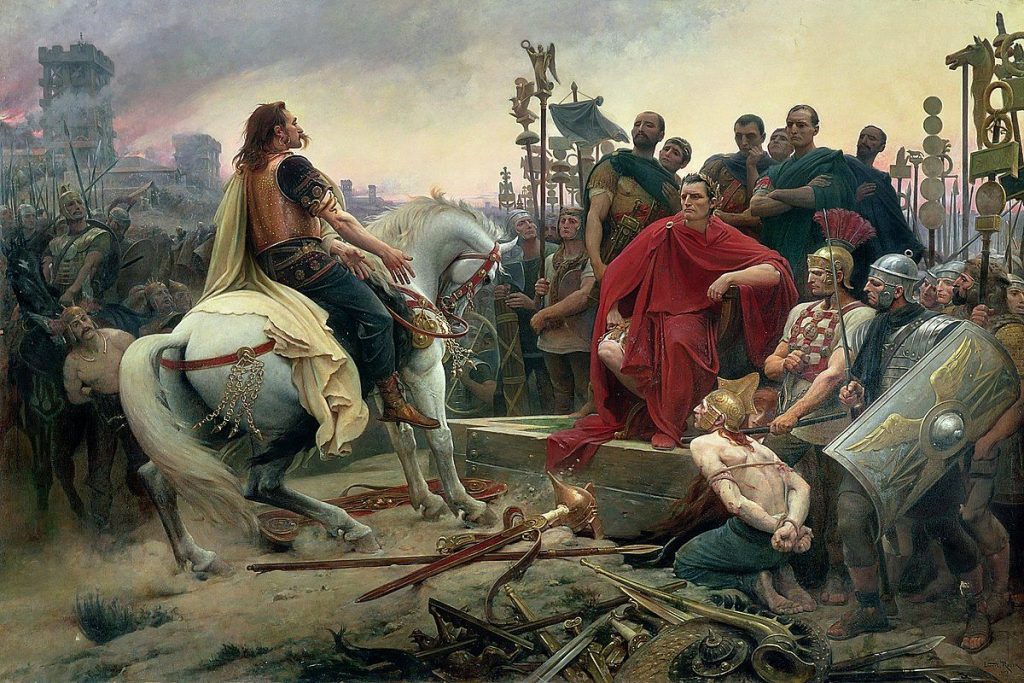
“A process cannot be understood by stopping it. Understanding must move with the flow of the process, must join it and flow with it.”
~ Frank Herbert
“Clear thinkers take feedback from reality, not society.”
~ Naval Ravikant
A long-established society has many protections, barriers, and guardrails that prevent a single man from taking power.
But there are always arenas where a single man has the upper hand, the edge, the shot, the chance – and society has no choice but to allow him to try.
These arenas are in the periphery, where reality asserts itself, and society must give way.
At its borders, a society encounters other societies, many of which have conflicting interests, and are willing to contest its goals. If the society does not promote men who are effective in the arena of war, it will gradually lose territory to those who do. Therefore a man may rise up in the periphery where conflict occurs.
Outside of the densely settled areas, in the resource and transport zones, a society encounters the raw ferocity of nature, red in tooth and claw. To operate in these zones, men must be hard and capable, regardless of the social codes of the larger society. Therefore a man may rise up in the periphery where Nature reigns.
New technologies open up new frontiers within the existing system. Unexplored territory suddenly appears. It can be anywhere. For example, the Industrial Revolution caused the new frontier of factory production to emerge in the cheap land next to cities. To master the new frontier, to overcome its dangers and challenges, men must be bold and daring. The larger society cannot understand the new problems nor conceive of the new solutions. Therefore a man may rise up in the periphery where new frontiers emerge.
I look out at the world and I see:
- Wars in the contested areas between the major civilizations, with a desperate race to master new technologies in order to win. Drones, communications, satellites, smart missiles.
- The decay of the old infrastructure from the 20th-century systems that focused on raw size, and the emergence of new 21st-century infrastructure focused on flexibility. Mesh networks, smart public transport, logistics apps.
- New technologies that have opened up new frontiers. Blockchain, AI, social media.
All of these are training grounds for potential Caesars.
Any realm at the edge of society
where reality is unavoidable
where chaos is a constant companion
where danger and victory lurk around each and every corner
where understanding must move with the flow of the process
can produce a man capable of rising up
and willing to try.
Advice For Ambitious Readers
Don’t be weak. Produce value. Get into politics. Prepare to move to the next level.
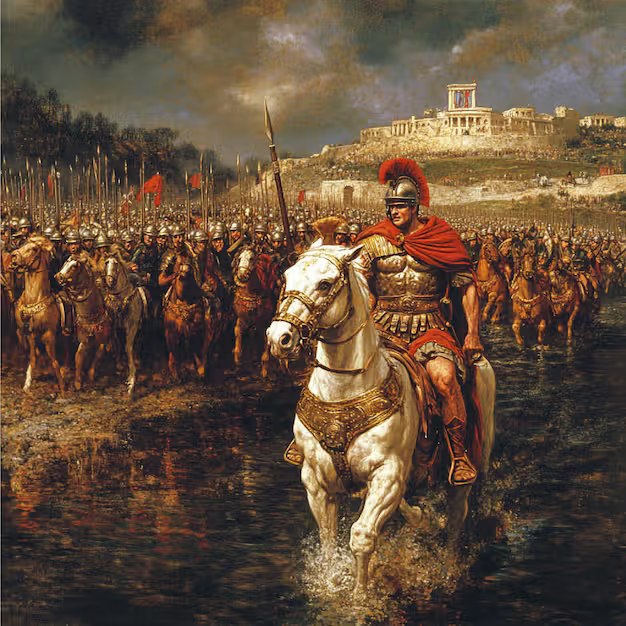
“Opportunity doesn’t wait for you to be ready.”
~ Liu Cixin
“Before enlightenment, chop wood and carry water. After enlightenment, chop wood and carry water.”
~ Zen Proverb
1) Get fit.
I don’t mean perfect, I mean good. Good enough to run, lift, and fight.
Concretely:
- Lift weights (you can just use bodyweight e.g. push-ups & pull-ups are fine)
- Running or similar
- Yoga or similar
These improve your:
- Strength
- Endurance
- Balance
Crucially, they also improve your understanding of your own ability to experience difficulty and get to the next level.
This will give you self-confidence that will spill out into other areas of your life (if you allow it to do so). You will improve your capacity to undertake and complete projects.
Both men and women can sense weakness in men, and do not like it.
If your basic physical condition improves, people will respond more positively to you, in every aspect of your life, and you will like and respect yourself more.
Note: You’ll need to alter your diet to allow your body to improve. More protein & fat, less sugar & carbs.
2) Develop at least one tradable skill, and maintain it.
If you are at risk of being automated, replaced, or outsourced, you have a problem. Things which aren’t needed tend not to stick around. The only real solution is to become more competitive.
A man must produce more than he consumes, or else he will soon be on his way to the uranium mines. We like to dance around this reality, and pretend it ain’t so, but… it is.
3) Save in the tools of your trade.
Don’t save in a currency that is inflating. (If you’re doing this right now… why ?)
Instead, take advantage of the fact that you are best placed to evaluate the current and future value of the tools of your daily trade. Buy tools that allow you to improve your future ability to produce, and which you can sell at a good price if necessary.
To generalize: The act of saving is really the act of betting on the future utility of a thing.
When people save by buying a house in order to sell it in 10 years’ time, they are betting that the future utility of that house will be higher. But this is not always true. What is the average value of housing in Ukraine or Portland, today ? Higher or lower than it was 10 years ago ?
4) Get into politics.
You may not be interested in politics, but politics is interested in you.
If you have anything worth having, other people will want it, and some of them will make an effort to take it.
I do hope this isn’t news to you, it’s been this way since forever, but people like to pretend.
So: You need to join a political group. This is sometimes a political party, but can also be any other group of people that has political interests and capabilities. Otherwise, if you operate as a lone wolf, another political group will eventually try to take what you have, and they’ll win, because you have to sleep sometime, and there are more of them.
Even wolves aren’t stupid enough to be lone wolves, if they can possibly avoid it.
5) Invest in a capable political system.
If you are a member of an expanding state, full of energy and vitality, then investing in government bonds is a great idea. Alternatively: A basket of shares in the top companies.
If you are a member of a shrinking state, full of anxiety and incompetence, then don’t do this. At some point, it will turn on its savers, and inflate their holdings away.
The key problem is: How can you a) join a political system that is competent and expanding and b) buy shares in some aspect of it ?
Which leads us to:
6) Find a Caesar.
During inflection points in history, where old systems fall apart and Caesars rise up to establish new ones, the notion of “investing in shares” without being a political player becomes increasingly nonsensical.
The ability to buy shares or own things is increasingly limited to people who are good terms with a Caesar and his organization.
It’s only later, much later, when everything settles down, and the cycle moves again into the aristocratic and democratic stages, that you can allow yourself to think about a “share” or “ownership” as something detached from the structure of power.
If it helps, think of assisting a Caesar in his rise as investing in a high-risk high-reward political startup. Plenty of people in the past made this exact choice. Sometimes it worked, sometimes not.
So: Watch for a new Caesar, and be ready to join him.
Note: Not all that glitters is gold. Not every Caesar is worthy.
And now, the final challenge, for gold-star readers only:
7) Become Caesar.
Welcome to the boss level.
It will take everything you have, just as table stakes.
If you succeed, no one will thank you. They will envy you, admire you, worship you, offer you everything they have, beg you for small favors, undermine you with rumors and gossip, fight each other for the chance to serve you, and start rebellions to topple you. But here’s what almost none of them will ever do: Thank you, understand you, or be inspired by you and transform themselves into something better.
Success will not even be particularly rewarding for you. If you succeed, the path will have been so difficult, the personal transformation so painful and complete, and the betrayals and battles so wounding and scarring, that, as you settle yourself wearily on top of a throne of skulls, you will wonder “was it worth it ?”.
Probably not.
Whatever system you establish, the cycle will continue, and new generations will curse their elders’ incompetence, the same as you did, and eventually one of them, victorious in the periphery, hard and scarred, will take up a sword and raise a banner, and march inwards to tear down the suffocating, unbearable government that you left behind…
As it has ever been, so shall it ever be, world without end, amen.
But: This path is also one of the most interesting lives one could lead. It will not, at any point, be boring. It will grip your attention all the way through, until you find your end in the golden palace or the muddy ditch, as the case may be.
And, if you are living in a time of confusion, calamity, and collapse, you may say to yourself: “I know that there is nothing to go back to… and therefore I shall walk forward boldly, cry ‘Havoc!’, and let slip the dogs of war.”
Let us say then this path is not taken for pleasure, but for meaning.
It is strange, no? That one man’s name should echo down so many centuries, that kings of other peoples should name themselves after him (Qaisar, Kaiser, Tsar), that even now we still shiver slightly at the sound of the name of the second Roman who marched on Rome…
Regards,
StJohn Piano
Latest Articles
- The Neglected Value of BreastfeedingOn the benefits of breastfeeding
- Architecture Without a FutureOn architectural historicism
- The Absurdity of the EverydayOn seeking and creating meaning
- Bridging Science and SocietyOn interdisciplinary collaboration
- Renewable Baseload PowerOn the future of energy
- AI and the Battle for CommunicationOn control of communication
- Operating in a Bitcoin WorldOn the new monetary order
- Beyond Political NostalgiaOn hope as a political force
- The New Age of CaesarsOn the end of liberal democracy
- Social Media: Five Stages of GriefOn reclaiming our attention
About the author
StJohn Piano began working in blockchain technology in 2014, and has built storage tools, publishing systems, tradebots, smart contracts, and payment processors. Previously, he worked in speech recognition, robotics, and engineering simulations. He reads a lot of history and appears frequently on the Tela Network Podcast.
Positions:
🔹 CTO @ Solidi Cryptocurrency Exchange
🔹 Blockchain Advisor @ Tela Network
Links:
👉 Add StJohn Piano on LinkedIn:
linkedin.com/in/stjohnpiano
📺 Check out the Tela Network Podcast:
https://www.youtube.com/@TelaNetworkPodcast
📩 Message StJohn Piano directly on Tela (reply guaranteed):
https://tela.app/id/stjohn_piano/7b90ed
🚀 Book a call with StJohn Piano through Tela Consulting:
http://telaconsulting.pro
📘 Read more of StJohn Piano’s writing on Substack:
https://networktheory.substack.com
Updates
Sign up to the CATALYST Updates Substack to receive the monthly schedule for new articles, news on the physical print-run of CATALYST’s inaugural issue, and details on the upcoming CATALYST Conference.

